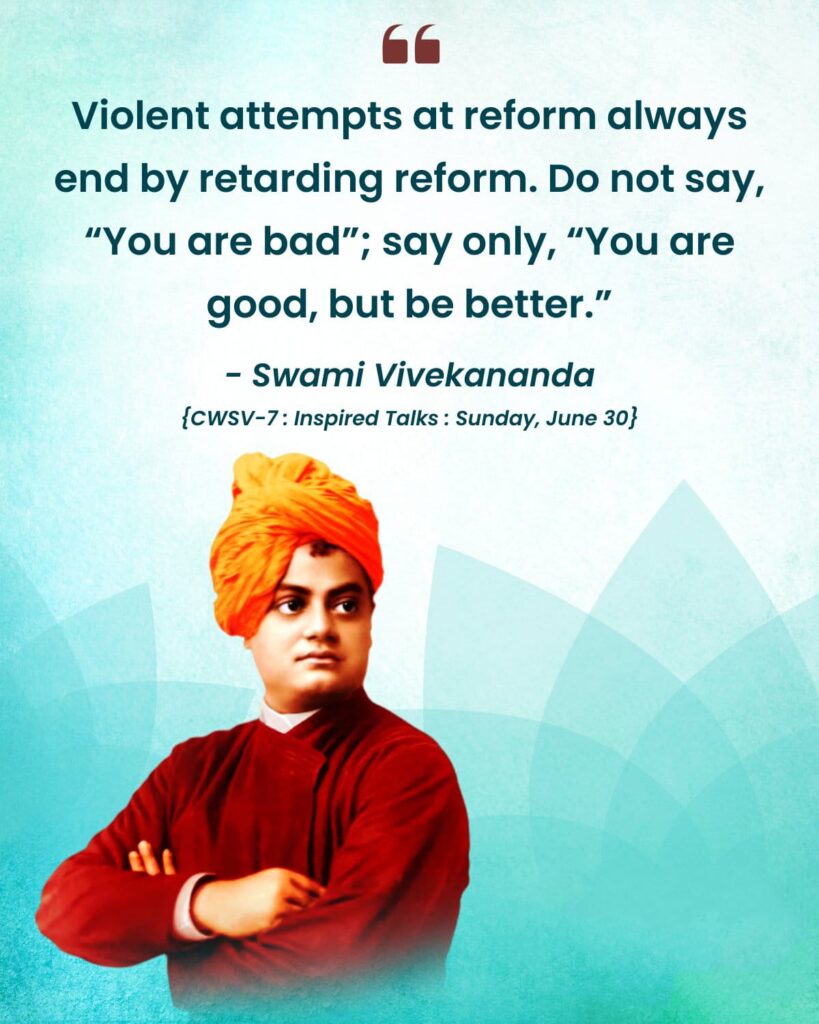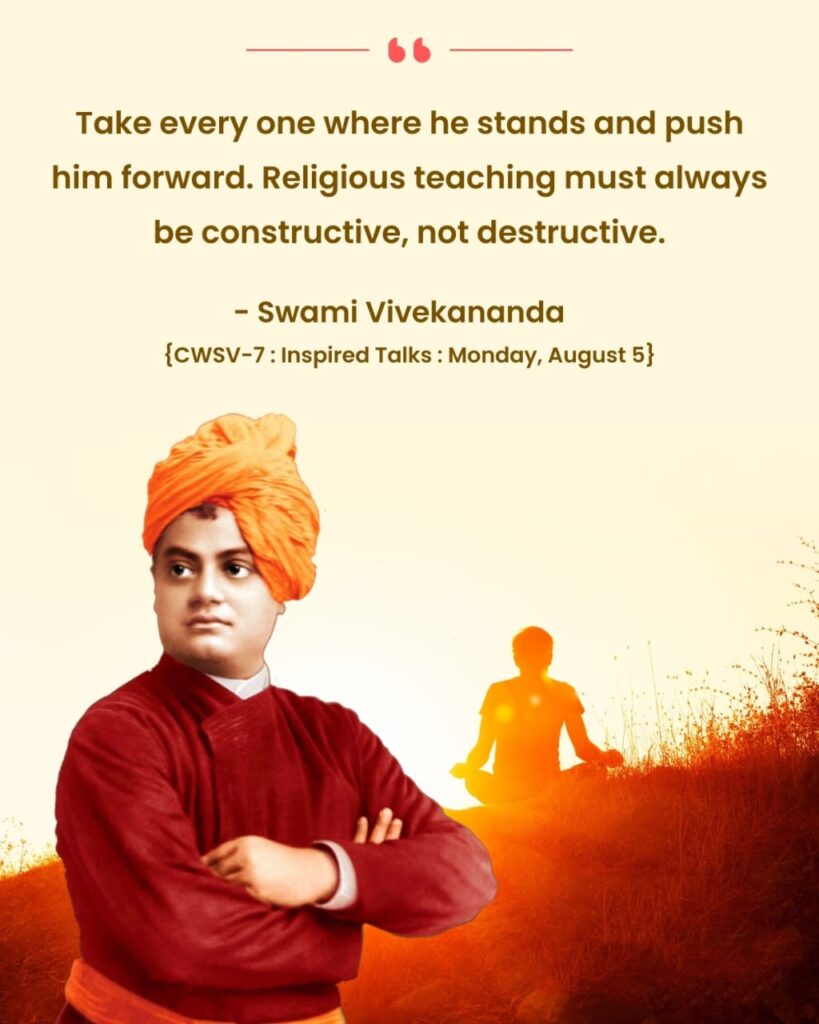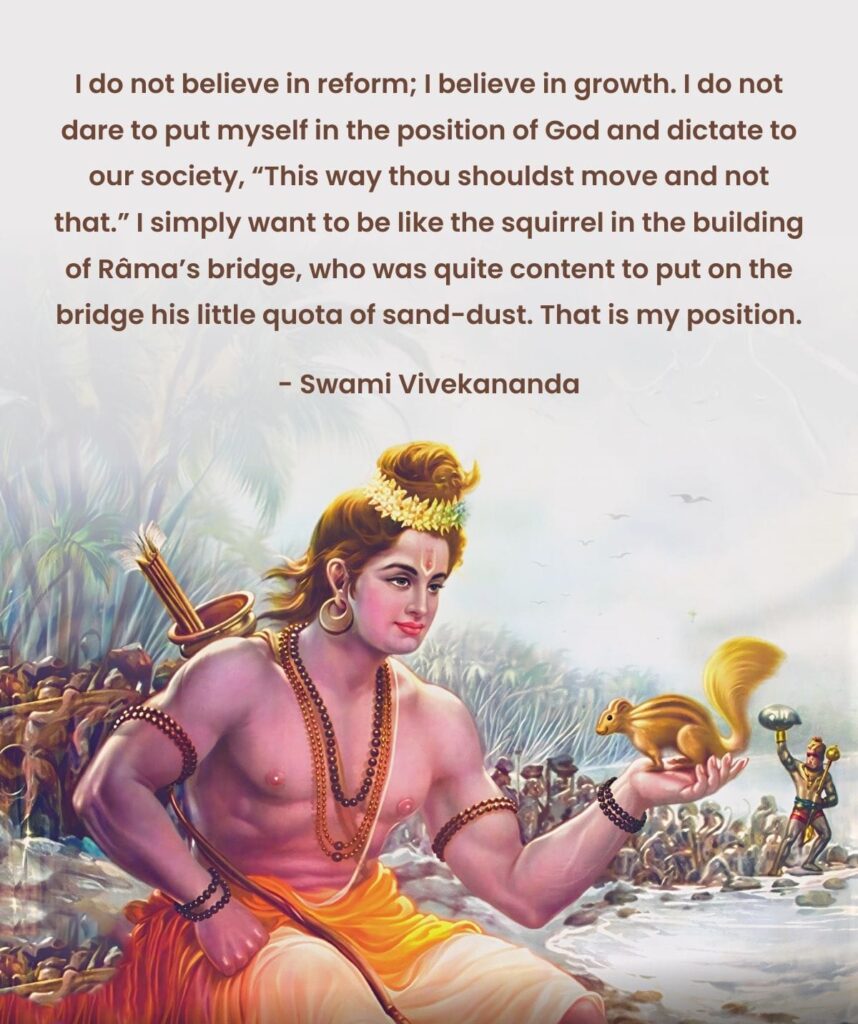न बुद्धिभेदं जनयेदज्ञानां कर्मसङ्गिनाम् |
जोषयेत्सर्वकर्माणि विद्वान्युक्त: समाचरन् || 26||
na buddhi-bhedaṁ janayed ajñānāṁ karma-saṅginām
joṣhayet sarva-karmāṇi vidvān yuktaḥ samācharan
na—not; buddhi-bhedam—discord in the intellects; janayet—should create; ajñānām—of the ignorant; karma-saṅginām—who are attached to fruitive actions; joṣhayet—should inspire (them) to perform; sarva—all; karmāṇi—prescribed; vidvān—the wise; yuktaḥ—enlightened; samācharan—performing properly
Translation:
The wise man should not disturb and confuse the minds of the ignorant attached to action. By performing all actions with yogic equanimity, they should make the ignorant do accordingly.
Commentary:
The Lord continues to lay stress on the duty of the wise to lead the people on the right path by personal demonstration of karma yoga.
The Jnani, though he is individually free from all action and work, should not disturb and confuse the minds of the people by abstract doctrines and theories. He should set the example by his personal life. It is only then that people could understand the secret of Karma yoga. The world is action; life is action; people are acting in a variety of ways; the whole of nature is in ceaseless motion. The realised sage may understand the state of absolute stillness in the Supreme Being, but for all others, it is a theory that they do not comprehend. Several people who are religiously-minded are doing worship with some faith in God in the hope of gaining some worldly good. The poor man worships God to attain some property. The sick man worships God to be relieved of pain and suffering. The house-holder beset with a thousand difficulties all around worships God to overcome the troubles of life. All this is sakama karma. But it would be foolish to tell them that what they are doing is wrong.
Such verbal teaching makes no meaning to them. It might confuse their minds and some of them may give up action, thinking that it is the right path. So the wise man should be careful that his teaching does not run counter to the law of nature and human disposition. He should remain steadfast in the Atmic state, work without attachment, be equal-minded under all circumstances, and emanate peace and blessedness all around him. Thus the people would see and understand how they should live and work. It is not theory. It is the direct personal example the lord wants the wise man (Vidvan) to present before the people.
Anyone with a little learning of religious theory can make impressive speeches from the public platform. People may admire his eloquence and flowery flow of language. But it does not enlighten the people. Anything could be affirmed or denied by subtle argument. This leads nowhere. Instead of clarifying the position, it makes confusion worse confounded. But real solid experience and practical living needs no argument to prove the efficacy of religious realisation. When we come across a realised one who emanates peace and blessedness by his very presence, all doubts come to rest and the seeker experiences a state of mind which is an affirmation of spiritual Truth. No more argumentation, speculation, theories and dogmas, and doubts. They are all gone, and people would come to know what life in the Spirit is and how to live it. That is what the Lord expects the wise man to do.
Doing with equanimity: The Lord’s command is that the wise man, established in the Self, should perform work with equanimity and by his detachment, purity, and peace show the way to all.
Swami Vivekananda Says —
Q. — Are sects, ceremonies, and scriptures helps to realization?
A. — When a man realizes, he gives up everything. The various sects and ceremonies and books, so far as they are the means of arriving at that point, are all right. But when they fail in that, we must change them. “The knowing one must not despise the condition of those who are ignorant, nor should the knowing one destroy the faith of the ignorant in their own particular method, but by proper action lead them and show them the path to come to where he stands.”[Source]
Do not try to disturb the faith of any man. If you can, give him something better; if you can, get hold of a man where he stands and give him a push upwards; do so, but do not destroy what he has. The only true teacher is he who can convert himself, as it were, into a thousand persons at a moment’s notice. The only true teacher is he who can immediately come down to the level of the student, and transfer his soul to the student’s soul and see through the student’s eyes and hear through his ears and understand through his mind. Such a teacher can really teach and none else. All these negative, breaking-down, destructive teachers that are in the world can never do any good.[Source]
Speak out the truth boldly, without any fear that it will puzzle the weak. Men are selfish; they do not want others to come up to the same level of their knowledge, for fear of losing their own privilege and prestige over others. Their contention is that the knowledge of the highest spiritual truths will bring about confusion in the understanding of the weak-minded men, and so the shloka goes: “One should not unsettle the understanding of the ignorant, attached to action (by teaching them jnana): the wise man, himself steadily acting, should engage the ignorant in all work.”[Source]
What right have you to say that this man’s method is wrong? It may be wrong for you. That is to say, if you undertake the method, you will be degraded; but that does not mean that he will be degraded. Therefore, says Krishna, if you have knowledge and see a man weak, do not condemn him. Go to his level and help him if you can. He must grow.[Source]
Even if you have knowledge, do not disturb the childlike faith of the ignorant. On the other hand, go down to their level and gradually bring them up. That is a very powerful idea, and it has become the ideal in India. That is why you can see a great philosopher going into a temple and worshipping images. It is not hypocrisy.[Source]





Sri Ramakrishna Says —
One should not discuss the discipline of the Impersonal God or the path of knowledge with a bhakta. Through great effort perhaps he is just cultivating a little devotion. You will injure it if you explain away everything as a mere dream. (Source: Gospel of Sri Ramakrishna)
If the spiritual life is intensified, the outer life will adjust itself automatically; this principle applies equally to the life of an organization.
— Swami Brahmananda
Be the change you wish to see in the world.
— Mahatma Gandhi
Question: How should the wise teach the ignorant?
Answer: The wise should live a pure life and work in a detached way, and set an example for others to follow.